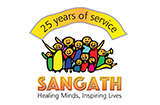Outlive is a youth suicide prevention programme which addresses urban youth suicides in India by engaging young people aged 18-24, in particular youth with experiences related to suicide/self-harm, distress or mental health problems.
Why Outlive?
India has one of the highest suicides in the world and contributes to one-third of suicide deaths across the world (approximately 700,000 globally). Suicide is the single leading cause of death in young people aged 15 29 years in India. There are multiple factors which contribute to youth suicides in India such as academic stress; discrimination based on caste, gender and sexuality; breakdown of intimate relationships; unemployment; substance use; violence and lack of access to youth-centric support services. Young people also experience barriers in seeking support such as stigma, high-costs, low awareness and lack of confidentiality.
Currently, there are very few suicide prevention programs in India which specifically address the needs and life-contexts of a diverse youth population specifically in the age group of 18 to 24 years.
We understand that one size doesn’t fit all and there is no single solution for suicide prevention. To prevent youth suicides, we require different approaches that address problems experienced by young people.
How are we addressing the issue?
Outlive is a youth suicide prevention programme led by the Centre for Mental Health Law & Policy, Indian Law Society (CMHLP, ILS) in collaboration with its partners Sangath and Quicksand Design Studio. Outlive addresses urban youth suicides in India by engaging youth (aged 18-24) with experiences of suicide/self-harm, distress or mental health problems.
Outlive centres youth partnership in all its programs by engaging youth with lived experience as staff, advisors, trainers, peer supporters and youth advocates. Outlive’s programs were co-designed with 50 youth through a series of consultations and co-design workshops.
Outlive’s Programs
1. Public Engagement Campaign – enabling youth with suicide prevention resources to tackle stigma
- Conducting workshops in colleges and communities to improve literacy on youth suicides, challenge myths and share resources to support oneself and others.
- Sharing Stories of hope of young people who have survived suicide through videos, blogs, and artwork
- Disseminating youth suicide prevention resources offline and digitally through India’s first youth suicide prevention resource platform for youth who are in crisis or need to support loved ones who may be contemplating suicide.
2. Outlive Chat – saving young lives through chat-based peer support
Outlive is implementing a youth peer support program to train youth volunteers to provide chat-based emotional support through a web-based app which was co-designed with young people. The program helps identify youth having thoughts or plans of suicide; provide emotional support; facilitates safety planning (an evidence-based tool); and refer youth to other resources, helplines and psychosocial organisations for further support.
3. Youth Advocacy for Suicide Prevention (YASP) Fellowship – empowering youth leaders in policy and governance for suicide prevention.
YASP Fellowship builds capacities of youth leaders to address governance issues related to suicides as a bridge between their communities and policymakers.
What is the potential impact?
Outlive’s objective is to empower and enable young people to tackle stigma related to suicide, provide suicide prevention support and work towards systemic change in their specific contexts so that youth have
- Increased awareness about suicide prevention and mental health
- Access to rights-based peer-led suicide prevention and support services
- Skills to engage with policy maker on suicide prevention.
Where have we reached?
Our team held consultations and co-design workshops with over 50 young people to understand their experiences and ideas on youth suicide prevention. The group of participants included English-, Hindi-, and Marathi-speaking youth from diverse backgrounds across Delhi, Mumbai, and Pune. Based on their ideas and feedback, Outlive has co-developed its suicide prevention interventions.
1. Public engagement intervention: We have developed a public engagement intervention based on young people’s suggestions and ideas. As part of the intervention, we engage with young people through public events, awareness workshops, and social media campaigns to encourage conversations on suicide prevention.
Outlive’s public events include panel discussions, talks, film screenings, and art exhibitions. These help facilitate conversations and improve awareness about youth suicide prevention. We engage with young people through large-hall sensitisation sessions and interactive workshops aimed at building participants’ literacy and awareness on suicide prevention strategies, how to cope with distress, and resources for seeking help in crisis situations.
As of June 2024, Outlive has reached over 5500 youth through over 85 workshops in colleges and community centres.
Outlive has also launched a myth busting poster campaign on social media and across college campuses to help break common misconceptions and end the shame and stigma associated with suicide. The team has created psychoeducational resources on understanding suicide, helping oneself, and how one can support a person who is dealing with thoughts of suicide. These myth busting posters and resources are available on Outlive’s website in English, Hindi, and Marathi. We also invite stories of lived experiences to highlight the importance of talking openly about suicide and seeking help, challenging stigma and promoting recovery. A series of young people’s stories are available on Outlive’s website as video films and written blogs.
2. Peer support programme: We have developed a peer support programme in consultation with suicide prevention experts, mental health professionals, and young people with lived experience of suicide and mental health problems. This programme trains youth volunteers between the ages of 18-24 years to provide online chat-based emotional support to young people experiencing emotional distress or thoughts of suicide. Outlive’s peer supporters are mentored by Outlive peer mentors through individual and group mentoring.
As of 2024, over 130 young people have completed peer support training.
Based on inputs from young people and research, we have also developed Outlive Chat – a fully anonymous, free-of-cost online platform for young people in distress to connect with a trained peer supporter and access chat-based emotional support.
Between August 2023 and December 2024, trained peer supporters have responded to over 1,500 chat requests from young people in distress.
3. Youth Advocacy for Suicide Prevention Fellowship Programme:
Outlive’s YASP Fellowship Programme builds capacities of young people to enable them to engage with policymakers and influence policy processes on youth suicide prevention within their own communities. The YASP Fellowship comprises a hybrid foundational training and individual mentoring for YASP fellows to develop skills such as understanding youth suicides as a governance issue, identify community & policy gaps, and develop advocacy strategies to engage policymakers to prevent youth suicides through governance and policy mechanisms.
The YASP Fellowship has trained over 20 fellows who have reached out to 1000 youth and other stakeholders across eight tier-1 and tier-2 cities in India (Raipur, Bhubaneshwar, Jaipur, Srinagar, Gangtok, Pune, Mumbai and Delhi). YASP Fellows have advocated for various issues impacting youth suicides including gender-based violence, welfare provisions for informal labourers, bullying in schools, caste-based discrimination in educational institutions and affirmative support for trans communities.
To learn more about Outlive, visit our website outlive.in and follow our social media handles. Instagram: @the.outlive.project. Twitter: @OutliveProject.
Project Leads
Soumitra Pathare, Centre Mental Health Law & Policy, ILS, Pune
Pattie Gonsalves, Sangath, Goa
Sweta Pal, Sangath, Goa
Avinash Kumar, Quicksand Design Studio
Funders & Partners
Funded by
Comic Relief, UK
Dasra, UK
Partners
Sangath
Quicksand Design Studio



